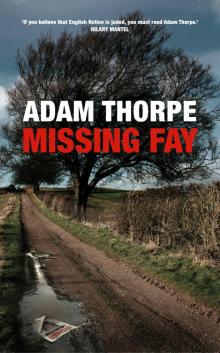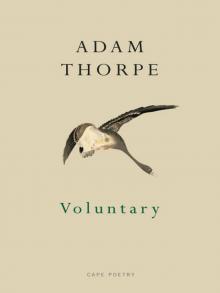- Home
- Adam Thorpe
No Telling Page 21
No Telling Read online
Page 21
‘But people might not buy them if they’re more expensive,’ I said.
‘Gilles, we’re not a bargain basement. This is top quality. This is the Rolls-Royce of industrial vacuum cleaners. They don’t call them industrial vacuum cleaners, in fact. They call them commercial vacuum cleaners. People will pay that bit extra for the Rolls-Royce of commercial vacuum cleaners. They’ll be begging at that door, chum.’
I boasted about this to Christophe; it was as if having American stock made us superior in some way, that we had finally won our laurels. On each vacuum cleaner there was an American address punched into a small steel plate: Pittsburgh USA followed by numbers and letters like a code.
‘We’ll probably have to go to Pittsburgh on business,’ I said. ‘We’re the sole agent for Sunburst Inc., counting the whole of France. They can suck your eyeballs out from half a metre and they sound like a jet fighter. 3,200 watts.’
‘So can Marie-Louise,’ Christophe smirked. ‘If you try to touch her up.’
‘What, she sounds like a jet fighter?’
Christophe laughed at my joke, for once. Marie-Louise was the daughter of the baker near the shop; she had huge lips and liked watching rugby on TV.
My uncle had told me that we were sole agent for the south-west Paris area, in fact, but that sounded pathetic. Christophe’s father had just come fifth in the whole of France in the national carp-fishing competition, having been runner-up in the south-west Paris area: that was definitely true because it was in the local paper, with a photograph of him holding a carp before throwing it back. I felt jealous: my uncle’s face had also appeared in the local paper, but that was because of the robbery. He’d looked like a man on a wanted poster, and much younger, with more hair on the front.
Christophe was wriggling his hips about and pouting his lips, imitating Marie-Louise. I threw pine needles over him but he carried on, walking about as if he was in a floor show and looking really stupid. The sheets of corrugated iron on the gate started to wobble. Then the gate opened wide, carrying the sheets with it.
A man stepped in, holding what looked like a briefcase.
‘There’s someone there,’ I said.
‘Oh, I want to suck your eyeballs out,’ said Christophe in a loud girly voice, wobbling about on pretend high heels.
‘Shuddup. There really is.’
‘Shuddup! Shuddup! You’re so crue-el!’
The man pushed the gate back with a squeal. Christophe sort of jerked and became normal. We both pretended to look normal as the man came towards us. He stopped and took something out of his briefcase, keeping its flap open under his chin. He then walked around the grounds, nodding at us and wishing us good day as he passed. He was making notes on a clipboard that was resting on the briefcase that was resting on his arm. He was probably in his twenties, with a purple suit and striped tie and hair slicked down by oil. The suit had the widest lapels I’d ever seen.
He tiptoed up the stone steps as if they might collapse and used a large key in the double doors. He pushed open the right-hand door and took out a torch from his briefcase, holding its flap under his chin again. He disappeared inside, closing the door behind him.
It was the first time we had seen anyone else here.
‘Maybe they’re going to clean it up,’ I said. ‘Make it into a hospital again.’
‘Hope not, mate.’
The man emerged about twenty minutes later. We said good morning as he passed us. He stopped and asked us how we’d got in. He was very polite, as if we were older than him. He had Immobilier Lambert in fancy gold letters on his clipboard.
‘By the gate,’ I said.
He looked over at the gate, smiling a bit.
‘Not with a key, I hope.’
Christophe shook his head.
‘You could have a very nice musical concert in here, in the summer,’ the man said. ‘I play the trombone.’
We nodded.
‘Do either of you lads do any music?’
‘No,’ I said.
I heard Christophe start to snort though his nose. I was gripped by the desire to laugh, too, although I didn’t want to laugh. The effort not to laugh made my eyes wet.
‘Oh well,’ said the man, ‘I expect you’ll regret it, later.’
He walked away, and we burst into hysterical laughter before he’d gone out of the gate. He didn’t turn his head, though. I felt bad, but didn’t say so to Christophe. I imitated the man, instead: he’d spoken with a Midi accent like someone in a Fernandel film.
‘He was a nutter,’ said Christophe, wiping his eyes. ‘A fucking nutter.’
‘It said Immobilier on his clipboard.’
‘So what?’
There was a silence. A little red squirrel ran across under the pine-trees.
‘Make a good hotel,’ Christophe murmured. ‘Swimming pool. Rich chicks in bikinis.’
We decided to explore the prefabricated wing again – properly, this time. Half of the asbestos tiles on its roof had fallen off and its windows were all broken. Water kept dripping onto us in the half-darkness, although it wasn’t raining. There was a nasty smell of cat’s piss. Christophe reckoned we’d find torture instruments from the Gestapo days and bloodstains on the walls.
In one of the desks were cardboard files dated 1942–43. We were pretty sure that was in the war. One file had a design for a ‘hoisting shaft’ drawn on stuff like tracing paper, and notes in French about ‘procurements’ of things like milling-machines and rolls of khaki and chronometers. The others were just lists of people’s names, but we didn’t recognise any. The only real clues were some books. We found them in a drawer, with lots of rusty butterfly clips. One was called Les Joyeuses Histoires Juives and had two ugly men on the cover with nasty staring-white eyes and round caps. Someone had written their name inside, right across the title, and dated it 20 Janvier 1942. The name, once we’d made it out, was the same name as on one of the main furniture shops in Bagneux: Raoul Mantharl.
The other two books were in a language we reckoned was German, printed in thick black lettering. We reckoned it was German because both books had Bertelsmann-Verlag, Gütersloh, Deutschland at the bottom of the first page, which we decided was where they’d made the book. The first book was by someone called Hans Hoeschen. It had photographs of sad or ashamed-looking men with beards and pockmarked skin, as well as lots of dead women with blood all over them. The men had Jude printed under, which we thought must mean Jew. Maybe they were the husbands of the murdered women.
Christophe got excited because he found the owner’s name at the back, in neat handwriting: SS-Scharführer Max Hossler. The second book was like the first one but had a picture of a tank firing away on the cover and fell completely apart as we opened it. It had belonged to the same person. Christophe looked for more clues on the pages that had fallen out, behaving like a serious detective.
‘It wasn’t Gestapo then,’ I said. ‘It was SS.’
‘No difference,’ said Christophe, frowning as he examined the pages. ‘Both liked dogs, children and sausages.’
That was one of his father’s jokes, in fact. The two books that didn’t fall apart were a bit yellow and some of the pages were stuck together with damp, but I decided to keep them. I thought my uncle might be amused by the stories about Jews. I could pretend I’d invented them myself.
‘Do you think Monsieur Mantharl was in the SS?’
‘I hope not,’ said Christophe. ‘He’s one of our best customers. He gives a party for all his employees at Christmas and we supply the meat, mate.’
I took the two books back with me and hid them in a toy drawer, under a broken Meccano lift. I sat in my chair with my wrists crossed around the back and pretended I was being interrogated about the books by the man from the Immobilier, who was really the SS. My nails were ripped out and stuff.
I spent all afternoon helping my uncle in the showroom, setting the demo models out. We dragged them into place on their well-greased wheels and planted t
heir American names and suction power details on cardboard next to them. We talked to each other as adults, and I think I impressed him with my keenness. The big cardboard cut-out woman was leaning against the wall. My uncle looked at her and said she was definitely an ‘outgoing tenant’. She seemed sad behind her smile, suddenly. She looked quite like Mademoiselle Bolmont, in fact.
I asked him if I could keep her, for my room.
‘As long as you don’t think she’s your girlfriend,’ my uncle joked.
‘Do you know Monsieur Mantharl?’
‘Of course. Excellent customer. He’s got two Tornados for the shop.’
‘Was he in the SS?’
My uncle laughed, if a bit coldly.
‘Where did you hear that?’
‘Just someone at school.’
‘He certainly was not in the SS. Blimey, what a thought. Wouldn’t say boo to a goose. But I tell you what. This is where it might have started. He got going – the business, I mean – by selling Jews’ furniture in the market.’
‘Jews’ furniture? Is Jews’ furniture different?’
‘Yeah, it doesn’t eat pork.’ He chuckled at his own joke. ‘It was up for grabs, that was the difference. The Jews couldn’t take it with them, could they? Not where they were going. Old Mantharl, he got in there quicker than the Germans and sold it off at a decent price. Doing his bit for France, or it’d all have been shipped to Berlin like the rest. Antiques, heirlooms, big old clocks, Persian carpets.’
‘From Jews’ shops, you mean?’
‘From their homes, chum. And their shops, I suppose. Nice bolts of cloth. Beds. Jewellery. Everything. Old Mantharl got in there before the looters, you see.’
‘How could you tell they were Jews’ homes and shops?’
‘It was easy. They had a big Juif painted on.’ My uncle chortled. ‘There was a second-hand furniture place a few doors up from us, where that gap is now. Owned by this old bloke called Goldberger. It had a big juif in black, on the window, all dribbling down. I remember that.’
‘Did Mantharl get Goldberger’s furniture, too?’
‘Not likely, it was poor old rubbish, really. Big ugly wardrobes. Mantharl kept to the posh stuff. Huge stall, Mantharl had. I remember it. It got bigger and bigger. He bought a garage, then an old warehouse, and ended up with what he’s got now. Four floors, fancy windows, prime site. Nice bloke. Who’s spreading nasty rumours, chum?’
‘Can’t remember. Just what someone said.’
‘Ridiculous. The SS were evil bastards. Bastards. Evil bloody bastards. Some of them were out in Algeria with us.’
‘Germans?’
‘French ones, Gilles. There were French blokes in the SS, y’know, chum. Hit one on the nose, once. He’d had a glass too many, got boasting about it. I had to be dragged off, or I’d have done something worse. Pity I didn’t.’
His jaw clamped so tight I could see the muscles rippling.
‘Don’t believe gossip, Gilles. See no evil, speak no evil, hear no evil.’
He looked at me hard, then. It was almost as if he did, in fact, know what stupid thing I’d thought about the robbery. To think evil of people was an evil in itself, as the priests had told us many times. I hoped he wouldn’t bash me on the nose, too.
‘Evil bloody bastards,’ he muttered, again. He took a deep breath. ‘Now, yank out the filter on that one. Right out. We’ll have it showing.’
While we worked, I had a thought.
‘When the Germans took over our house, was that the SS?’
My uncle snorted. He had a coin in his hand and was rubbing suction details in Letraset onto a big card. I was holding the card still.
‘You must be joking, chum. Just a lot of bloody useless Alsace boys, missing their mothers and pissing in the fireplace. Still Germans, though. Still Boche. In our own home. Requisitioning, they called it. Requisitioning. As if a long word made it all right.’
He rubbed the last letter too hard, and it tore.
There were quite a few visits from clients over the next fortnight or so, and the showroom sounded like an aerodrome or a rocket-launching pad. I began to address my new troops in an American accent, based on tourists I’d heard in Paris – like the one called Charlie who’d tried to pick my sister up.
‘OK,’ I’d say, ‘you’re new, you don’t know the ropes yet, but I know you’re strong and willing.’
But the machines remained very stiff in their steely uniforms, and I honestly had the impression that they thought I was stupid.
I went to the showroom less and less, spending more time in Carole’s room, listening to the radio or her records. Her room was more comfortable than mine, and smelt nice, and I wasn’t surrounded by my own stuff – comic books I’d grown out of, old toys, schoolwork, paintings done in primary school that embarrassed me but which I didn’t want to get rid of. Even my precious collection of beer mats glued above the bed sort of clogged my mind up, sometimes.
Carole had been moved from the mental ward to another place, in fact. This was a huge old mansion behind a lot of shrubbery not far from my school, the other side of Châtillon. My mother said it was a sort of rest home, and it meant Carole was ‘on the road to recovery’. It was ‘private’, she said, which meant the treatment was better but it was very expensive. We all had to tighten our belts.
Carole certainly seemed better, when we visited her, though she didn’t chat very much. She had calmed down, they said – ‘stabilised’. She was plumper, with spots on her face which my mother brought cream for, and her fingers were swollen so that she couldn’t sew or draw very easily. She ate a lot of sweet things, apparently, and mixed sugar with her potato purée.
We walked round the grounds with her if it wasn’t raining. The paths were damp between the shiny shrubbery. Muffled-up patients sat behind the columns of the main porch, watching the drips. The mansion itself was dilapidated-looking, with black marks under the windows like eyebags and mossy streaks down its brickwork. There was a plan to knock it down and build something new and full of light.
‘And another bastard of a developer’ll make a killing with State money,’ my uncle commented, as if he disapproved of clean new buildings.
Carole, when she talked, made complete sense, but what she talked about was boring, and her words came out rather slowly. Her hair, done by a person who came especially for the patients, made her look like a woman at a desk; it swelled around her head in shiny waves instead of tumbling naturally down. All this made me feel sad, although my mother would leave each visit feeling ‘relieved’, sighing with contentment. She would talk for ages with my sister about the new tumble-dryer or the dishwasher or the best shampoo or the nicest cream for your hands, but not about interesting things like the shooting of a man outside a Bagneux café by a fellow crook.
‘You need to wash it two or three times. Just as you start to feel it getting greasy, dear.’
‘Two or three times?’
‘I mean, before you feel a difference. Don’t give up too quickly. Not less than every three days or so, or it gets greasy quicker. Stral seems to work, anyway. You’ve inherited greasy hair from me. Oh, look at that bird.’
‘Can you bring me a bottle next time?’
‘I was going to anyway. Of Stral. They’ve done your hair very nicely, dear. Don’t let it get wet.’
‘What’s it called, Maman? The shampoo.’
‘Stral, dear. It’s very well known.’
‘Is it?’
‘It’s got proteins. There’s a special type for greasy hair. Alain uses the anti-dandruff one. Anyway, I haven’t had greasy hair since.’
It was just like an advertisement on television, each time – and I’d secretly pretend it was, and that the rest home was supposed to be our private mansion. The people wandering about muttering in dressing-gowns were those who hadn’t used Stral.
Our robbery was never mentioned, and I was told not to mention it. I tried talking about the American astronauts, but Carole just nodd
ed and went ‘mn’ and I would dry up. The worst thing was that they would talk about the same things almost every week. My mother might as well have brought along a magnetic tape.
I’d asked my mother if I could mention ballet, but she had shaken her head firmly, saying there was no point in stirring things. Carole hadn’t danced in the nude since, and hopefully wouldn’t ever again. I pictured my sister as having a deposit of sludge inside her, made up of all the interesting, dark things. Above that was this new, clear water we were swimming carefully through, between shampoo bottles and tumble-dryers and tubes of hand-cream.
On the way back, one day, I said how I’d like to see Nicolas.
‘Oh? Why?’
My mother was driving with my uncle next to her. Her jerky style made me feel sick in the back, along with the new smell of the car.
‘Concentrate on your driving,’ my uncle said. ‘Don’t bring things like that up or you’ll have us crash,’ he added, over his shoulder, trying to catch my eye in the rear mirror.
‘I can never bring it up,’ I said.
My mother, hunched over the wheel, peering through the windscreen as if driving through fog, said, ‘Of course you can.’
‘But not now, Gilles, OK?’
My uncle’s hand was chopping the air.
‘Where is he, in fact? Exactly?’
The car in front braked abruptly and my mother nearly went into it. I jerked forward and the back of the seat squashed my lip against my front teeth.
‘See what you made her do?’
‘I bloody well didn’t,’ I shouted, my hurt lip making me furious.
‘Don’t you swear at me, d’you hear?’ my uncle yelled.
‘Don’t shout, dear. Please.’
‘I’m not having him swear at his father!’
‘You’re not my father,’ I murmured.
‘Whassat?’
‘You’re Nicolas’s father, you’re not mine.’
‘Please, dear. Which way do I go, now?’

 Missing Fay
Missing Fay Hodd
Hodd Pieces of Light
Pieces of Light The Standing Pool
The Standing Pool Ulverton
Ulverton Nine Lessons From the Dark
Nine Lessons From the Dark Flight
Flight The Rules of Perspective
The Rules of Perspective From the Neanderthal
From the Neanderthal Is This the Way You Said?
Is This the Way You Said? Still
Still No Telling
No Telling Voluntary
Voluntary Between Each Breath
Between Each Breath